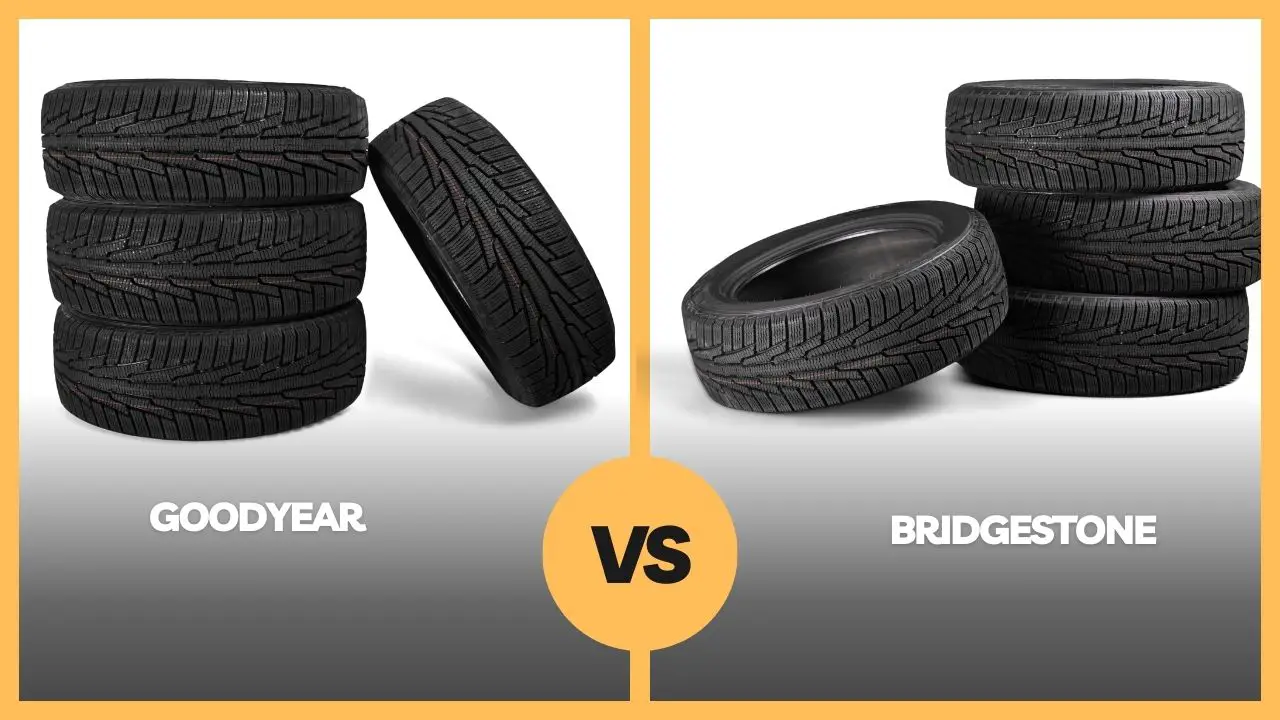Are you in the market for new tires but unsure which brand to choose? Look no further! In this blog post, we will explore the age-old debate of Goodyear vs Bridgestone and help you make an informed decision. We understand that selecting the right tires for your vehicle can be overwhelming, so let’s dive into the world of these two renowned tire manufacturers and discover what sets them apart.
When it comes to Goodyear and Bridgestone, both brands have established themselves as leaders in the tire industry. Goodyear, with its rich history dating back to 1898, has built a reputation for producing high-quality tires that offer excellent performance and durability. On the other hand, Bridgestone, a Japanese multinational company, has become synonymous with innovation and cutting-edge technology in the tire manufacturing realm. As we delve deeper into their respective offerings, you’ll gain valuable insights into the unique features and benefits that make Goodyear and Bridgestone stand out from the competition.
The Historical Journey of goodyear
Goodyear is an American multinational tire manufacturing company that was founded in 1898 by Frank Seiberling. The company was named after Charles Goodyear, the inventor of vulcanized rubber. Goodyear initially started as a small rubber and tire company in Akron, Ohio, but quickly grew to become one of the largest tire manufacturers in the world.
Over the years, Goodyear has expanded its product range to include a wide variety of tires for different vehicles and purposes. They offer tires for passenger cars, trucks, SUVs, motorcycles, and even aircraft. Goodyear is known for their innovative tire technologies, such as the run-flat tires that allow vehicles to continue driving even after a puncture. They also produce all-season tires, winter tires, and high-performance tires to cater to different driving conditions and preferences.
In addition to tires, Goodyear also manufactures other automotive products, including belts, hoses, and air springs. They have also ventured into the production of rubber and chemical products for various industries. Goodyear’s commitment to quality and innovation has made them a trusted brand in the automotive industry for over a century.
The Historical Journey of bridgestone
Bridgestone Corporation is a multinational company that specializes in the manufacturing of tires and rubber products. Founded in 1931 in Kurume, Japan, by Shojiro Ishibashi, the company initially focused on producing rubber soles for shoes. However, it soon expanded its operations to include the production of tires for bicycles and later automobiles. Over the years, Bridgestone has grown to become one of the largest tire manufacturers in the world, with a strong presence in both the original equipment and replacement tire markets.
Bridgestone offers a wide range of tire products to cater to various vehicles and driving conditions. Their product lineup includes tires for passenger cars, trucks, motorcycles, and agricultural and construction vehicles. They also produce high-performance tires for sports cars and luxury vehicles, as well as all-terrain and winter tires for enhanced traction in challenging road conditions. Bridgestone is known for its innovative technologies, such as Run-Flat tires that allow vehicles to continue driving even after a puncture, and Ecopia tires that provide improved fuel efficiency.
In addition to tires, Bridgestone also manufactures a range of other rubber products, including industrial rubber and chemical products, sporting goods, and bicycles. The company has a strong commitment to sustainability and has implemented various initiatives to reduce its environmental impact, such as developing eco-friendly tires and promoting recycling programs. Bridgestone continues to be a leader in the tire industry, constantly striving to provide high-quality products that meet the evolving needs of drivers worldwide.
In a hurry here are our top 6 tire recommendations:
- Best Budget Tires
- Best Mid-Range Tires
- Best All-Season Tires
- Best Summer Tires
- Best Winter Tires
- Best Performance Tires
goodyear : Pros and Cons
When it comes to tire selection, every tire brand showcases a distinct array of advantages and disadvantages. Below are the pros and cons of goodyear
Pros:
– Excellent traction and grip on both wet and dry surfaces
– Durable and long-lasting, providing good mileage
– Comfortable and smooth ride
– Wide range of options available for different vehicles and driving conditions
– Good value for money
Cons:
– Some customers have reported noise and vibration issues
– Limited availability in certain sizes and models
– Not the best choice for extreme off-road conditions
bridgestone : Pros and Cons
When it comes to tire selection, every tire brand showcases a distinct array of advantages and disadvantages. Below are the pros and cons of bridgestone
Pros:
– Excellent traction and grip on both wet and dry surfaces
– Long-lasting tread life, providing good value for money
– Smooth and comfortable ride quality
– Low road noise for a quiet driving experience
– Wide range of tire options to suit different vehicles and driving needs
Cons:
– Some models may have a higher price point compared to other tire brands
– Limited availability in certain regions or tire sizes
– May not perform as well in extreme winter conditions compared to specialized winter tires
Comparison: goodyear vs bridgestone Key Differences
When comparing goodyear and bridgestone, there are several key differences to consider. These differences include pricing, warranties, fuel efficiency, comfort, wet performance, dry performance, winter performance, and noise performance. Check out these other comparisons.
Let’s now dive deeper into how goodyear and bridgestone perform in each of these key focus areas.
Pricing:
– Goodyear generally offers more affordable pricing compared to Bridgestone.
– Bridgestone tires tend to be priced higher due to their reputation for high-quality and performance.
– Goodyear often provides budget-friendly options for everyday driving needs.
– Bridgestone focuses on premium tires with advanced technology and features, resulting in higher price points.
– Overall, Goodyear is a more cost-effective choice for budget-conscious consumers, while Bridgestone offers top-tier options for those willing to invest in quality.
Warranties:
– Goodyear offers a limited warranty that covers defects in workmanship and materials for a specified period.
– Bridgestone provides a limited warranty that covers defects in materials and workmanship for a specific time frame.
– Goodyear offers a tread life limited warranty that covers premature wear for a specified mileage.
– Bridgestone offers a treadwear limited warranty that covers premature wear for a specified mileage.
– Goodyear’s warranty may vary depending on the tire model.
– Bridgestone’s warranty may vary depending on the tire model.
Fuel Efficiency:
– Goodyear tires generally have better fuel efficiency ratings compared to Bridgestone tires.
– Goodyear focuses on developing fuel-efficient tire technologies, such as low rolling resistance compounds and tread designs.
– Bridgestone also offers fuel-efficient tire options, but they may not be as extensive as Goodyear’s range.
– Goodyear’s fuel-efficient tires may provide better mileage and help reduce fuel consumption, resulting in potential cost savings.
Comfort:
– Goodyear tires generally provide a smoother and more comfortable ride due to their advanced technology and focus on comfort.
– Bridgestone tires are known for their responsive handling and sporty performance, but may not offer the same level of comfort as Goodyear.
– Goodyear tires often have better noise reduction capabilities, resulting in a quieter and more comfortable driving experience.
– Bridgestone tires may offer better grip and traction, especially in wet or snowy conditions, but may sacrifice some comfort in return.
Wet Performance:
– Goodyear tires generally have better wet performance due to their innovative tread designs and advanced rubber compounds.
– Bridgestone tires also offer good wet performance, but may not be as effective as Goodyear in terms of grip and handling on wet surfaces.
– Goodyear tires are known for their excellent hydroplaning resistance, providing better control and stability in wet conditions.
– Bridgestone tires may have slightly shorter braking distances on wet roads, but Goodyear tires offer better overall wet performance and safety.
Dry Performance:
– Goodyear tires generally offer better dry performance due to their advanced tread designs and rubber compounds.
– Bridgestone tires may have slightly lower dry performance compared to Goodyear, but still provide good traction and handling.
– Goodyear tires are known for their excellent cornering stability and precise steering response on dry roads.
– Bridgestone tires may have a slightly longer braking distance on dry surfaces compared to Goodyear.
– Overall, Goodyear tires are often preferred for their superior dry performance and handling capabilities.
Winter Performance:
– Goodyear tires generally have better wet performance due to their innovative tread designs and advanced rubber compounds.
– Bridgestone tires also offer good wet performance, but may not be as effective as Goodyear in terms of grip and handling on wet surfaces.
– Goodyear tires are known for their excellent hydroplaning resistance, providing better control and stability in wet conditions.
– Bridgestone tires may have slightly shorter braking distances on wet roads, but Goodyear tires offer better overall wet performance and safety.
Noise Performance:
– Goodyear tires generally have better noise performance compared to Bridgestone tires.
– Goodyear tires are known for their quiet and comfortable ride.
– Bridgestone tires may produce more road noise and can be slightly louder.
– Goodyear tires are designed to minimize noise and provide a quieter driving experience.
– Bridgestone tires may offer good performance but may not prioritize noise reduction as much as Goodyear.
Use goodyear if:
Use Goodyear if you are looking for affordable tires that offer excellent traction and grip on both wet and dry surfaces, a comfortable and smooth ride, and a wide range of options for different vehicles and driving conditions. Additionally, Goodyear provides good value for money and is a durable and long-lasting choice, making it suitable for everyday driving needs.
Use bridgestone if:
Use Bridgestone if you prioritize high-quality performance and are willing to invest in top-tier tires. Bridgestone offers excellent traction, durability, and a comfortable ride, making it a suitable choice for those seeking long-lasting and reliable tires.
You May Also Like: goodyear vs cooper tires
Final Thoughts
In conclusion, the ultimate tire showdown between Goodyear and Bridgestone reveals that Goodyear offers more affordable pricing, budget-friendly options, better fuel efficiency, smoother and quieter rides, and excellent value for money. On the other hand, Bridgestone focuses on high-quality and performance, responsive handling, better grip and traction, but may sacrifice some comfort and produce more road noise. Ultimately, the choice between the two brands depends on individual preferences and specific driving needs.
This post contains affiliate links. Read the full disclosure here.


I am passionate about all things automotive and have a deep understanding of the topic. As a mechanic, I use my free time to share knowledge of everyday challenges that any car owner can experience – helping you make informed decisions about tires.

